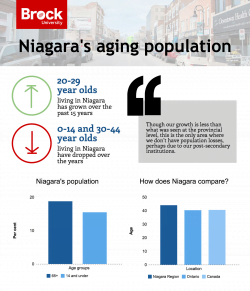Contrary to popular belief, the population of 20-somethings in Niagara is increasing, so efforts to attract and keep young people in the region need to be extended to more age groups, new Brock University-led research shows.
Youth attraction initiatives in communities tend to focus on those in the 20-29 age bracket. However, the Niagara population of people in their 20s has actually grown over the past 15 years, says the latest Niagara Community Observatory brief, titled Growing Niagara: A closer look at Niagara’s aging population.
The details of the brief were released Tuesday at a public presentation held at White Oaks Conference Resort and Spa in Niagara-on-the-Lake.
“Though our growth is less than what was seen at the provincial level, this is the only area where we don’t have population losses, perhaps due to our post-secondary institutions,” says the brief, co-written by Carol Phillips at the NCO and Adam Durrant from the Niagara Workforce Planning Board.
Meanwhile, the numbers of people aged 30-44 and 0-14 living in Niagara have dropped over the years.
“Assuming the latter are typically the children of the former, this illustrates the extent to which Niagara is not replacing its aging population,” says the brief. “This suggests that the focus of youth retention and attraction should be broadened.”
The brief provides closer examination of population numbers in Niagara, focusing on its age characteristics.
Highlights include:
- 18.8 per cent of Niagara’s population is 65 years and older while 15.5 per cent of its population is 14 and under
- The Regional Municipality of Niagara has a median age of 44.1 years, compared to 40.4 years in Ontario and 40.6 years in Canada
- Niagara’s 2011 population of 431,346 was a 0.9 per cent increase over 2006 compared to national population growth of 5.9 per cent
“As Niagara’s decision-makers look for ways to improve our community’s economic prosperity in the coming years, it’s vital they get the information they need,” says Phillips. “Our goal with this brief is simply to provide a piece of that information.”
Niagara Regional Council set its Strategic Priorities Implementation Plan in 2015 to increase the region’s “global attractiveness” and improve its economic prosperity. Attracting and retaining a younger skilled labour force is part of that strategy.
“There is no simple or single solution to addressing demographic challenges,” says Durrant. “Population changes at a local level require very long-range planning and a range of ongoing efforts to support multiple age groups that can lay the foundation for the future we would like to build.”
For interviews:
Carol Phillips, researcher, Niagara Community Observatory, Brock University, cphillips3@brocku.ca
Adam Durrant, Niagara Workforce Planning Board, adurrant@niagaraworkforceboard.ca 905-641-0801 x131
For more information or for assistance arranging interviews:
Dan Dakin, Media Relations Officer, Brock University ddakin@brocku.ca, 905-688-5550 x5353 or 905-347-1970
Cathy Majtenyi, Research Communications/Media Relations Specialist, Brock University, cmajtenyi@brocku.ca, 905-688-5550 x5789 or 905-321-0566
– 30 –




